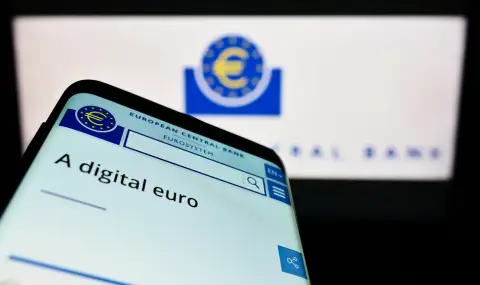The digital euro, also known as E-Euro or D€, was adopted as a project by the European Central Bank (ECB) back in July 2021. It envisages the introduction of digital money that can be used to pay both online and offline. It will not replace cash, but will only supplement it with a new digital alternative for payments, explains the German public media ARD.
The digital euro will be available to users in an electronic wallet and will be secured by a separate account at the central bank. This account will be managed by the user's respective commercial bank. An individual limit for holding up to 3,000 euros in electronic form is being discussed.
When will it be introduced?
According to the ECB and the European Commission, it is very likely that the digital euro will be introduced in the coming years, but a final decision has not yet been taken. In November 2023, the ECB began a two-year preparatory phase, including numerous coordination measures.
"The ECB's Governing Council will decide on the possible issuance of a digital euro only after the relevant legislation has been adopted," the bank said. This suggests a final decision in the first half of 2026 at the earliest. and put into circulation in 2027 or 2028 at the earliest, we learn more from the ARD publication.
What is the difference compared to other digital payments?
In electronic payment transactions, such as bank transfers and card payments, euro amounts are also transferred in digital form. However, the digital euro promises even greater security than established forms of payment, since in the event of a crisis it will not be affected - for example, in the event of the bankruptcy of a commercial bank or a private payment service provider. The ECB also claims that the virtual euro will be more inviolable, since personal data will not be transmitted during transactions. In this sense, its anonymity will be comparable to that of cash, notes ARD.
If the amounts are transferred from one bank account to another, the costs will be lower, since current payment models also include a third party - the service provider.
What is the difference with cryptocurrencies?
The main difference with cryptocurrencies such as Bitcoin or Ethereum is that the digital euro is a product of the ECB, i.e. it remains under the control of the central bank's monetary policy. By controlling the money supply, the ECB also tries to ensure the stability of the currency.
For critics of the current monetary system, however, this very control is the reason for the boom in cryptocurrencies, which largely avoid the influence of central banks.
What is particularly important for consumers, however, is that the European digital currency will be legal tender just as much as cash and the old savings books, in which amounts were manually deposited. Retailers will therefore have to accept the digital euro at the cash desk or online. There is no such obligation to accept cryptocurrencies.
Why do the EU and the ECB want the digital euro?
In addition to the aforementioned benefits for consumers, the EU institutions are pursuing other important goals with the introduction of the electronic euro. Above all, it aims to ensure the sovereignty of European payment transactions, because not only cryptocurrencies, but also planned virtual currencies of countries such as the UK, China and the US threaten the role of the euro as the dominant means of payment in the long term.
In addition, a payment system with an electronic euro could create a counterweight to the dominant American payment service providers such as Visa, Mastercard, GooglePay, ApplePay and PayPal.
"The digital euro would promote sustainability, competitiveness and innovation in European payments", the ECB says. "It would provide a pan-European solution for payments in the euro area under a European regulatory framework."
Since electronic euro money would be held in separate accounts, it could be subject to different basic interest rates than cash and savings accounts. In extreme cases, it will be possible to stimulate consumption and thus boost the economy with punitive interest rates on amounts in digital euros, the ARD also explains.
How do private banks relate to the digital euro?
While private banking institutions welcome the European digital currency, they also have a few problems with it. Some of the money that customers will hold in digital currency will likely be lost to banks as deposits, and therefore to their traditional lending business. This is one of the reasons, along with concerns about the risk of money laundering, that upper limits on the size of digital wallets are being discussed.
The digital euro also represents a separate payment system with which the ECB will compete directly with banks and private payment service providers. Here too, a coordination process is underway, in which the final distribution of roles is not yet clear, ARD summarizes.
Author: Detlef Landmesser ARD
